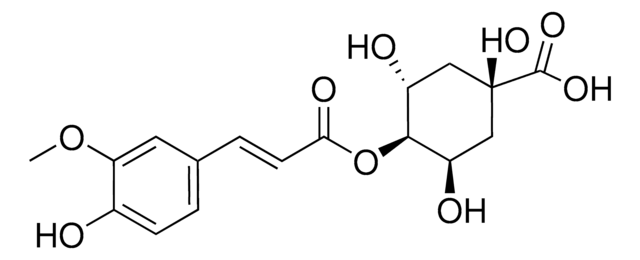PHL80425
3,4-Dicaffeoylquinic acid
phyproof® Reference Substance
Synonyme(s) :
4,5-Di-O-caffeoylquinic acid, 4,5-Dicaffeoylquinic acid (CAS), Isochlorogenic acid C
About This Item
Produits recommandés
Qualité
primary reference standard
Gamme de produits
phyproof® Reference Substance
Essai
≥95.0% (HPLC)
Forme
solid
Fabricant/nom de marque
PhytoLab
Température de stockage
2-8°C
Chaîne SMILES
O[C@@H]1C[C@@](O)(C[C@@H](OC(=O)\C=C\c2ccc(O)c(O)c2)[C@H]1OC(=O)\C=C\c3ccc(O)c(O)c3)C(O)=O
InChI
1S/C25H24O12/c26-15-5-1-13(9-17(15)28)3-7-21(31)36-20-12-25(35,24(33)34)11-19(30)23(20)37-22(32)8-4-14-2-6-16(27)18(29)10-14/h1-10,19-20,23,26-30,35H,11-12H2,(H,33,34)/b7-3+,8-4+/t19-,20-,23+,25-/m1/s1
Clé InChI
UFCLZKMFXSILNL-RVXRWRFUSA-N
Vous recherchez des produits similaires ? Visite Guide de comparaison des produits
Catégories apparentées
Description générale
Application
- Neuroprotection in Parkinson′s Disease: Research on 3,4-Dicaffeoylquinic acid from Calendula officinalis highlights its potential neuroprotective effects through modulation of the PI3K and ERK signaling pathways, suggesting its application in Parkinson′s disease management (Zhang et al., 2024).
- Antioxidant and Anti-inflammatory Activities: Studies on the antioxidant and anti-inflammatory properties of 3,4-Dicaffeoylquinic acid in Merremia umbellata extract suggest its therapeutic potential in treating inflammatory conditions, making it a valuable component in natural phenolic compound research (Lee et al., 2023).
- Hypoglycemic Effects on Type 2 Diabetes: 3,4-Dicaffeoylquinic acid has been studied for its hypoglycemic effects via network pharmacology and transcriptomics, showing promise in type 2 diabetes treatment. This research underscores its importance in biochemistry and pharmacological innovations (He et al., 2024).
- Screening Natural Antioxidants: The compound′s effectiveness in screening and evaluating natural antioxidants demonstrates its utility in developing analytical standards for identifying potent bioactive compounds in various botanical parts (Yang et al., 2024).
- Molecular Docking for Drug Development: 3,4-Dicaffeoylquinic acid is used in molecular docking studies to identify interactions with PPARγ, aiding in the discovery of potential drug candidates from natural sources. This application is crucial for advancing drug discovery in biochemistry and pharmaceutical sectors (Elkhattabi et al., 2023).
Autres remarques
Informations légales
Code de la classe de stockage
11 - Combustible Solids
Classe de danger pour l'eau (WGK)
WGK 3
Point d'éclair (°F)
Not applicable
Point d'éclair (°C)
Not applicable
Faites votre choix parmi les versions les plus récentes :
Certificats d'analyse (COA)
Vous ne trouvez pas la bonne version ?
Si vous avez besoin d'une version particulière, vous pouvez rechercher un certificat spécifique par le numéro de lot.
Déjà en possession de ce produit ?
Retrouvez la documentation relative aux produits que vous avez récemment achetés dans la Bibliothèque de documents.
Notre équipe de scientifiques dispose d'une expérience dans tous les secteurs de la recherche, notamment en sciences de la vie, science des matériaux, synthèse chimique, chromatographie, analyse et dans de nombreux autres domaines..
Contacter notre Service technique






